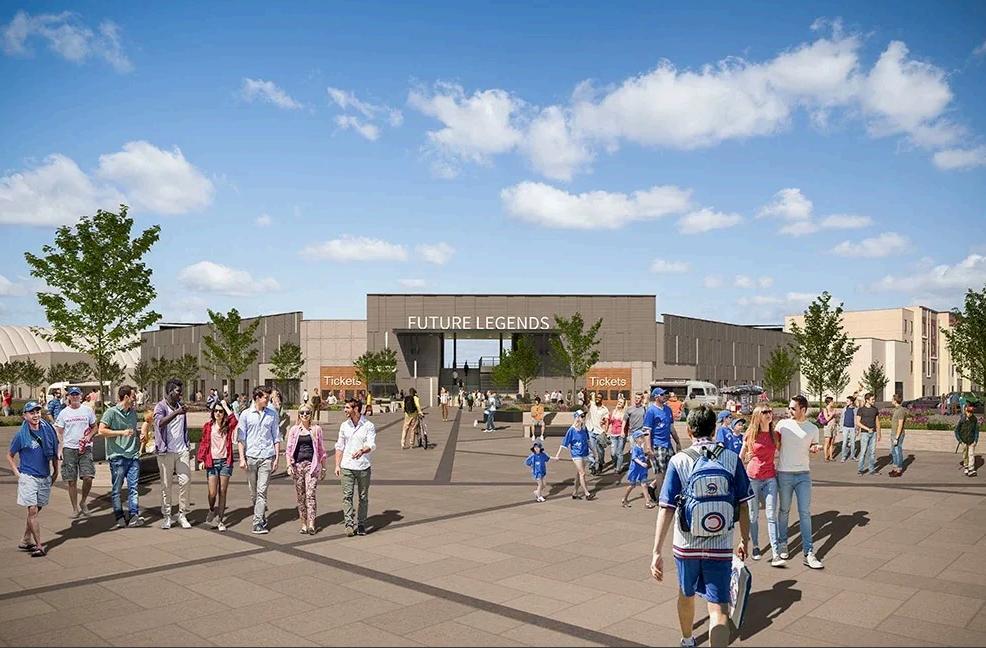STEPHANIEFERNANDEZ
PROJECTMANAGER
DesignManifesto
I believe architecture has the power to elevate the human experience while shaping more equitable, resilient, and connected communities My design vision is rooted in promoting sustainability, ecological intelligence, and the wellbeing of individuals while responding to the broader needs of the neighborhoodsweserve.
Grounded in an appreciation for history and place, I embrace innovation as a tooltobuildresponsiblyandcreatively.Myworkisguidedbyadeeprespectfor theenvironment,culturalcontext,andthepeoplewhoinhabitourspaces
Iprioritize:

Sustainable Design: Crafting spaces that reduce environmental impact through energy-efficient systems, resource-conscious materials, and longtermadaptability.
Ecological Integration: Weaving natural systems into the built environment topromotebiodiversity,resilience,andadeeperconnectiontonature
Wellness and Well-being: Designing environments that support physical, mental, and social health through daylight, access to nature, and humancenteredspatialdesign
Human Experience: Creating architecture that is inclusive, responsive, and enriching fosteringconnection,creativity,andcommunityengagement.
Byblendingtraditionwithinnovation,andvisionwithempathy,Istrivetodesign places that are both enduring and transformative. Through collaborative, mission-driven practice, I aim to contribute meaningfully to the built environmentandthelivesittouches
MOORESTREETAPARTMENTS
Atlanta, GA

Moore Street Apartments is a five-story, 250-unit multifamily development located along Martin Luther King Jr. Boulevard in Atlanta. Designed to enhance urban density and housing diversity, the project features wood-framed construction over a partial podium slab, wrapped around a 365-car precast parking structure to maintainanactivestreetedge.
Galloway provided conceptual design and drawing packages for the project, including ten apartment layouts ranging from studios to four-bedroom units. The design promotes flexibility, walkability, and community connection through a mix ofunittypesandamenity-drivenplanning.
As Architectural Project Lead, I contributed to conceptual planning, layout studies, and coordination with consultants to support early feasibility and urban integration. This project reflects a thoughtful approach to infill housing prioritizingaccessibility,scale,andlong-termlivabilityinarapidlygrowingcorridor.
Concept/DesignPackage
EstimatedConstructionCost:$85Million
TotalBuildingArea:200,000Sq.Ft. Galloway&Co. Role:TeamLead


FUTURELEGENDSSPORTSCOMPLEX
Windsor,CO

Future Legends is a 118-acre, next-generation sports and entertainment campus in Windsor, Colorado. Designed to host professional and youth athletics, the complex includes a 6,000-seat stadium, an indoor multipurpose dome, 35+ fields and courts, two hotels, athlete dorms, an e-sports arena, and over80,000squarefeetofretailanddining.
As Architectural Project Lead, I contributed to construction documentation and interdisciplinary coordination across architecture, civil, MEP, structural, and landscape design teams. The project was developed in partnership with the TownofWindsorandfollowsafour-phasemasterplan.
Keyresponsibilitiesincludedsupportingthedesignandtechnicaldevelopment of:
Stadiumandindoordomefacilities
70,000sfathletedormitorycomplex
10,000sfe-sportsarena
HiltonGardenInnandHamptonInn(four-storypodiumstructures)
Retail,concessions,clubhouse,andmaintenancebuildings
Future Legends is a regional anchor that blends high-performance athletic design with economic and community development representing the scale, complexity,andcollaborationthatdefinemyarchitecturalapproach.
PartiallyCompleted:2023
EstimatedConstructionCost:$225Million
ProjectArea:118acres. Galloway&Co. Role:ProjectLead


CAMPWOODWARD-WINTERSPORTS TRAININGFACILITY
CopperMountain,CO

This barn-like facility located in the picturesque ski town of Copper Mountain Resort provides a versatile and adaptive space that caters to a wide range of wintersports,includingsnowboarding,skiing,andfreestyleactivities.
The training camp includes 19,000 square foot of terrain park and pipe progression with design features such as foam pits, trampolines, and air bags to facilitatesafepracticeofaerialmanuvers andreducestheriskofinjury.
Interiors include spaces for rest, recover, and social interaction to foster a communityamongathletes
The project is Green Globes certified and integrates efficient systems and the use of eco-friendly materials. The Camp Woodward Winter Sports Training Facility aims to be a premier destination for winter sports training, offering athletestheresourcesandenvironmentneededtoexcelintheirdisciplines.
YearCompleted:2019
ConstructionCost:$10Million
TotalBuildingArea:22,000Sq.Ft.
dcbConstructionCompany,Inc.
Role:ProjectManager


YearCompleted:2022
ConstructionCost:$6Million
TotalBuildingArea:56,000Sq.Ft.
dcbConstructionCompany,Inc
Role:ProjectManager


Careful site planning ensures optimal positioning of the building to capture breathtaking mountain views, while the integration of solar panels reflects a commitment to sustainable practices. Noteworthy design elements address Telluride's mountain climate, encompassing considerations for snow loads and the incorporation of energy-efficient wall assemblies, ensuring durability and resilience. Advanced security measures and convenient accessibility enhance the user experience, and the design allows for future adaptability to meet evolving storage needsandtechnologicaladvancements.
MEGROUPOFFICE ADAPTIVEREUSE


The 3040 Blake Street warehouse, originally constructed in 1932-33, stands as a testament to Denver's industrial heritage. Initially home to the Denver Engineering Works Company, it served as a hub for manufacturing activities, housing essential functions like the boiler shop, steam engine works, and pattern shop within its sturdy masonry walls and distinctive double exposed bowstringtrusses.
Over the decades, the warehouse evolved into a versatile space, offering an open layout that lends itself well to adaptive reuse while retaining its historic charm. This adaptive reuse not only preserves the building's architectural character but also aligns with sustainable principles, making efficient use of existingstructuresratherthannewconstruction.
In a forward-thinking initiative, the M.E. Group pursued WELL Building Certification Silver for the Blake Street warehouse. This certification underscores their commitment to creating a healthy and productive workspace that enhances the well-being of its occupants. By integrating sustainable practices and modern amenities, the warehouse has been transformed into a comfortable office environment that reflects contemporary standards while respectingitshistoricalroots.
Through careful planning and design, the Blake Street warehouse exemplifies howadaptivereusecanblendhistoricalpreservationwithmodernfunctionality, offering a compelling case for revitalizing older industrial buildings into vibrant, sustainablespacesforthefuture.
YearCompleted:2015
ConstructionCost:$8Million
TotalBuildingArea:22,000Sq.Ft.
dcbConstructionCompany,Inc.
Role:ProjectManager




KETCHUMARTSANDSCIENCEBUILDING UNIVERSITYOFCOLORADO
Boulder,CO

The renovation of the Ketchum Arts and Sciences Building at the University of Colorado Boulder breathes new life into a historic academic facility while enhancing its functionality for modern education. Originally constructed in 1938, the renovation focuses on preserving the building’s classical architectural elements, such as its brick façade and arched windows, while introducing contemporaryfeaturesthatsupporttheevolvingneedsofstudentsandfaculty.
The updated design emphasizes sustainability and accessibility, incorporating energy-efficient systems, improved natural lighting, and updated HVAC systems to meet current building standards. Inside, classrooms and collaborative spaces are reconfigured to foster active learning, with flexible layouts and modern technology that enhance interdisciplinary study and interaction.
Respecting its historical significance while advancing academic excellence, the Ketchum Building’s renovation blends the university’s rich legacy with forwardthinking design, ensuring that it remains a dynamic center for education at CU Boulder.
YearCompleted:2021
ConstructionCost:$16Million
TotalBuildingArea:13,000Sq.Ft. HordCoplanMacht Role:TeamLead


THECATALYSTSTUDENTHOUSING
Atlanta, GA

The Catalyst Student Housing project in Atlanta, Georgia, is designed to redefine the student living experience by offering modern, functional, and sustainable housing tailored to the needs of university students. Located near the heart of Atlanta’s academic hubs, the development focuses on creating a vibrant and connected living environment that fosters both academic success andcommunityengagement.
The building’s architecture blends urban modernity with environmental sensitivity, incorporating clean lines and contemporary materials while integrating eco-friendly design features. Large glass facades and expansive common areas provide natural light and create a sense of openness, reducing thefeelingofconfinementoftenassociatedwithtraditionalstudenthousing Inside, Catalyst offers a range of suite-style apartments, complete with private bedrooms, shared kitchens, and living spaces that promote a balance between privacy and communal living. The common areas, including study lounges, fitness centers, and outdoor courtyards, are designed to encourage collaboration and social interaction, reflecting the needs of a diverse student population.
YearCompleted:2021
ConstructionCost:$80Million
TotalBuildingArea:13,000Sq.Ft. Galloway&Co.. Role:TeamLead


TRAVELSKETCHES


